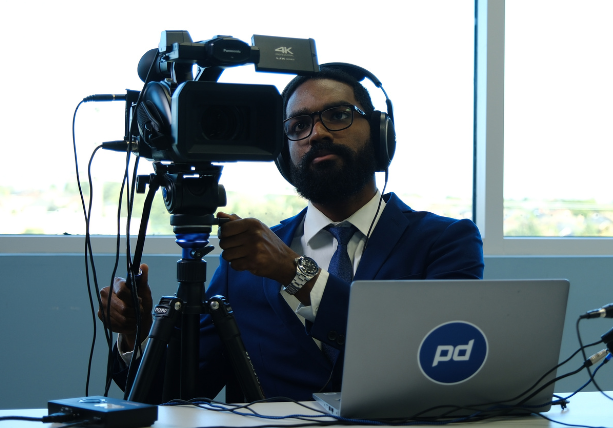The Significance of Lawful Video Depositions in Modern Legal Providers: What You Should Know
Lawful video clip depositions have become important in today's lawful landscape. They give a multidimensional view of witness testimonies that conventional transcripts just can not match. By recording both verbal and non-verbal interaction, these depositions enhance the total understanding of a witness's trustworthiness. The performance of video depositions hinges on numerous variables, consisting of compliance with lawful criteria and ideal techniques. Checking out these components exposes their real relevance in modern-day lawful solutions
What Are Lawful Video Depositions?
Legal video depositions work as an essential device in the lawsuits procedure. They include tape-recording witness testaments in a video layout, capturing both non-verbal and spoken interaction. This method allows lawyers to document the demeanor, expressions, and reactions of witnesses, giving a richer context for the statement. Commonly carried out in a regulated atmosphere, these depositions are led by lawyers that ask inquiries while a stenotype reporter documents the dialogue. The resulting video clip can be crucial for trial prep work, as it enables legal representatives to evaluate the integrity of witnesses and improve their methods. In addition, lawful video depositions can be made use of in various legal contexts, ranging from civil disputes to criminal situations. The visual and auditory aspects of video depositions enhance the discussion of proof, making it a crucial element in the modern lawful landscape. In general, they add considerably to the performance and efficiency of legal procedures.

Advantages of Video Depositions Over Traditional Methods
Video clip depositions use various benefits compared to conventional techniques of taking witness statements. One substantial advantage is the capacity to record both audio and visual components, supplying an extra comprehensive record of the witness's statements. This dual layout enhances clarity and allows attorneys to reference specific nuances during trial prep work. Furthermore, video depositions promote remote engagement, making it much easier for witnesses that might be not available for in-person appearances as a result of geographical constraints or health and wellness issues.Moreover, video depositions can quicken the general deposition procedure, minimizing the moment and prices connected with travel and logistics. They also boost ease of access, as recorded depositions can be easily shared amongst lawful teams and referenced at any time. This comfort adds to far better case administration and prep work. Generally, video clip depositions represent a modern, effective method to collecting witness testaments, straightening with the developing demands of the lawful profession.
The Duty of Body Movement and Tone in Testimonies

In lawful video depositions, body movement and tone play vital duties in conveying a witness's integrity and dependability. Nonverbal signs can provide understandings right into a witness's emotional state, influencing just how their testament is regarded. Understanding the influence of these components is important for lawyers and jurors alike when assessing the dependability of a testimony.
Nonverbal Interaction Insights
While verbal communication is typically stressed in legal statements, nonverbal cues such as body movement and tone play a necessary duty in sharing integrity and feeling. Onlookers of depositions may note that a witness's pose, gestures, and faces can substantially influence understandings of integrity. For circumstances, regular eye call may signify self-confidence, while avoiding gaze can recommend deceit or pain. The tone of voice-- its quantity, pitch, and rate-- can impart sensations of genuineness or unpredictability. Legal professionals must be attuned to these nonverbal signals, as they frequently give crucial context that complements spoken words. Comprehending these subtleties can enhance the performance of depositions and affect the result of legal proceedings.
Psychological Tone Impact
The emotional tone communicated throughout lawful testimonies greatly impacts exactly how a witness is viewed. Body movement, vocal inflections, and face expressions play vital roles in shaping the story of a testimony. A witness displaying confidence with consistent eye get in touch with and a tranquil tone can infuse a sense of reliability and engagement. On the other hand, signs of anxiety, such as fidgeting or an unsteady voice, might bring about suspicion regarding their account. The nuances of psychological expression can affect the analysis of realities, making it essential for lawyers to identify these signs. In video clip depositions, the acoustic and visual parts combine, highlighting the relevance of psychological tone in communicating genuineness and reliability within the legal procedure.
Credibility and Credibility
An essential consider developing reputation and dependability throughout statements hinges on the witness's body language and intonation. Observers typically rely upon non-verbal cues-- such as eye get in touch with, stance, and motions-- to evaluate a witness's sincerity. A witness that maintains eye get in touch with and shows open body language may be viewed as even more straightforward and trusted than one that prevents eye contact or shows up shut off. Additionally, tone of voice plays a crucial function; a constant, tranquil tone can enhance the trustworthiness of the testimony, while fluctuations in pitch or quantity might raise uncertainties. Inevitably, the mix of body language and singing tone considerably influences how a witness's declarations are gotten and interpreted in a legal context.
Best Practices for Conducting Video Depositions
Carrying out video clip depositions requires careful preparation and execution to ensure a reliable and clear discussion of testament. Initially, it is necessary to select a silent, well-lit area to minimize disturbances and safe and secure optimum video quality. The equipment ought to be evaluated ahead of time, consisting of cameras, microphones, and lighting, to prevent technological concerns during the deposition.Next, parties involved must evaluate the format and treatments in advance, making sure that every person comprehends their roles. The deponent should be oriented on the procedure, including just how to react clearly and concisely.Additionally, keeping a specialist attitude throughout the session is important. This includes avoiding talking over one another and validating that all inquiries are routed suitably. It is critical to tape-record the deposition in a style that allows for very easy playback and evaluation, protecting the stability of the testament for future use.
Legal Factors To Consider and Conformity Issues
Just how do legal factors to consider and conformity concerns influence the effectiveness of video clip depositions? Lawyers must browse a complicated landscape of policies, making sure that video depositions follow administrative policies and standards. Conformity with laws worrying privacy, authorization, and recording techniques is important. As an example, acquiring explicit authorization from all celebrations involved is required to stay clear of lawful repercussions.Additionally, the admissibility of video clip evidence in court can hinge on compliance with procedural demands. Ensuring that the equipment utilized satisfies technical requirements is additionally crucial, as low quality can undermine the deposition's reliability.Moreover, attorneys should know any type of specific state regulations that regulate video clip depositions, as these can differ substantially. Failing to attend to website here these factors to consider can not only threaten the honesty of the deposition but additionally affect the overall instance method, eventually influencing the customer's legal results.
Exactly How Video Depositions Influence Jury Perception
While video clip depositions can act as effective tools in lawful proceedings, their impact on jury understanding is substantial. The visual and acoustic aspects of video clip recordings offer jurors with an extra detailed understanding of witness attitude, reliability, and psychological feedbacks. This multimedia method can boost the jurors' capability to evaluate the reliability of testimony contrasted to typical text-based transcripts.Moreover, video depositions enable jurors to observe body movement, intonation, and faces, every one of which can influence their interpretation of the witness's statements. The existence of a witness on display can humanize them, fostering empathy and link, which might guide jurors' viewpoints. Conversely, a witness that appears unreliable or evasive on video might lead to unfavorable assumptions that affect a jury's decision. Inevitably, the dynamic nature of video depositions plays a crucial duty in forming just how jurors analyze proof and reach their judgments.
The Future of Video Clip Depositions in Legal Practice
As developments in innovation continue to reshape the legal landscape, the future of video depositions is poised for significant development. Innovations such as expert system, digital reality, and enhanced video clip conferencing tools are expected to improve the deposition procedure and boost access. Attorneys might make use of AI-driven analytics to analyze witness credibility and situation stamina a lot more effectively.Moreover, the assimilation of digital fact might permit courts to experience immersive simulations of depositions, offering deeper context and understanding. Furthermore, the pattern toward remote depositions is most likely to linger, using greater versatility for lawyers and customers alike.As remote job becomes progressively normalized, video clip depositions will likely end up being conventional practice, decreasing costs and time restraints connected with standard techniques. In general, these technological improvements promise to boost the effectiveness, effectiveness, and accessibility of video depositions in legal practice, inevitably changing exactly how attorneys plan for trial.
Regularly Asked Concerns
Just How Much Do Legal Video Clip Depositions Normally Cost?

Can Video Clip Depositions Be Utilized in Any Kind of Instance?
Video depositions can be utilized in various types of cases, consisting of civil, criminal, and household law. Their adaptability allows attorneys to existing witness statements efficiently, adjusting to the particular needs of different lawful scenarios.
What Tools Is Required for a Video Deposition?
To carry out a video deposition, important equipment consists of a premium video camera, microphone, lights, and a reputable recording device. Additionally, a computer with editing and enhancing software application may be needed for post-production and formatting the final video.
The length of time Does a Normal Video Deposition Last?
A regular video deposition lasts in between two to 4 hours, depending on the complexity of the instance and the number of inquiries presented. Extended sessions may happen, but breaks are generally integrated for participant convenience.

Are Video Depositions Admissible in Court?
Video depositions are generally acceptable in court, given they adhere to legal standards and regulations of proof. Their use enhances clearness and preserves witness statement, assisting in the judicial procedure during trials and hearings. Lawful video depositions have become essential in today's lawful landscape. Additionally, lawful video depositions can be made use of in different lawful contexts, ranging from civil disagreements to criminal situations. Additionally, video depositions help with remote participation, making it simpler for witnesses that may be inaccessible for in-person appearances due to geographical restraints or health and wellness issues.Moreover, video description clip depositions can quicken the overall deposition process, lowering the time and prices connected with traveling and logistics. Making sure that the devices used meets blog here technological criteria is likewise crucial, as poor high quality can threaten the deposition's reliability.Moreover, lawyers must be conscious of any type of certain state legislations that regulate video depositions, as these can vary considerably. Additionally, the pattern towards remote depositions is most likely to persist, providing higher adaptability for attorneys and clients alike.As remote job becomes progressively normalized, video clip depositions will likely become typical practice, minimizing prices and time restraints connected with conventional approaches.
Comments on “Why legal video depositions are redefining modern courtroom strategies”